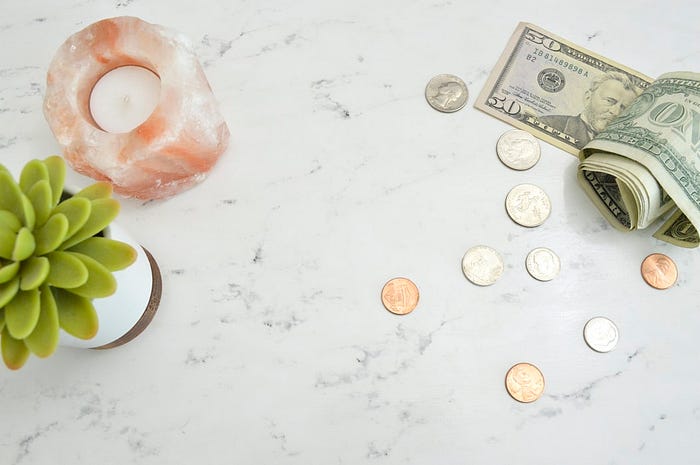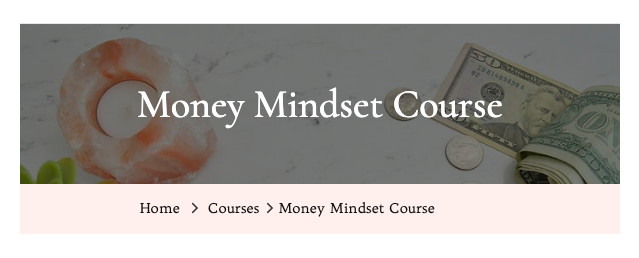One of the taboo topics in social circles, yet also one of the most loved topics on Medium is money. Money can bring up the biggest variety of emotions. But rest assured, even the rich and fancy oftentimes don´t have a healthy relationship with money. Since money is so subtle in how it influences our behavior, it can be tricky to dismantle the relationship we have with it.
No matter, if you have a lot of $$$$$$, a little, or no money at all: When it comes to the emotions that influence our behavior towards money, our relationship status with money has nothing to do with the numbers in our bank account, but everything with our mindset.
For example, you can earn $1000 a month, pay little rent for a place you like and don´t have many expenses, and be living happily ever after. You can also have $10.000 in your bank account each month, but be riddled with anxiety and worry about how to keep it, how to pay for your expensive lifestyle and how to impress people with your (net) worth.
Two completely different stories that can be exchanged, since in the end, what matters is the feeling about money and how we treat it, not how much we actually have.
The main patterns we have around money are from our primary care-givers. We learned about money by observing them, by what they taught us about it and our own worth, by giving or not giving us the material goods (and attention) we needed. This subtle influence is often hidden from our conscious mind, which is why positive affirmations rarely help, if there is not a definitive shift in behavior towards money that changes the invisible core beliefs.
Learning about Money in India
I spent two years in India meditating in a cave and learning from an enlightened master. Interestingly enough, most of what I learned from him was about my money patterns and unconditional love. No spiritual practices, no meditation, no energy work (I did that on my own account). But money, food, and love, that was my teaching from him.
He used to show me through his actions as a mirror all the sneaky ways my mind was tricking me into dealing with money, which was essentially not healthy for me. And that, when I had already let go of everything and felt extremely free and happy with my Himalayan life.
Below are a few examples of how money influences us and how we unconsciously behave towards it.

1. Toxic Money
Toxic money is a jaded way of dealing with money, when we accept it from someone, who has a personal interest in giving us the cash for his/her own benefit (hello VC´s?). It implies a subtle form of manipulation, control, and co-dependency, even if not outspoken. It shifts the power dynamic between two people and there needs to be a high level of awareness to not fall into the trap of the game. Usually, we don´t step into our full power in a dynamic like this, which also means we are not fully expressing ourselves and our most expansive potential that can manifest anything.
Toxic money can be money from parents, who still pay for us even when we can take care of ourselves already. It´s money from spouses, who pay for everything and therefore hinder us to step fully into our own power to turn our gifts into cash. It´s money from clients, who are a pain in the ass or who ask for unreasonable conditions. It´s money or gifts from a friend, who tries to buy our friendship, our services, or our time, without us being fully in alignment with the exchange. It´s a guy paying for drinks and dinner, expecting the women to go home with him afterward — leaving a certain type of pressure and expectation behind the exchange.
Toxic money is better avoided and politely declined. It infuses our energy field with a hidden power dynamic, which affects our consciousness and therefore how we behave. Whenever we can earn our own money in alignment with our values, and find new ways of generating income to pay for what we truly need or truly want, we better get the $$$ together ourselves. Because once we believe we can, we activate hidden resources and find ways to do so.
Join the Money Mindset Course here.
2. Rejected Money
The biggest problem in the spiritual community is a denial of the need for money. “Money is evil” or “People with money are bad” are the common denominators. The question is why? We need money to pay for our rent, our clothing, our food, our travel, our workshops / classes / free time, which in turn ensures that we feel good about ourselves and our life.
When we limit ourselves, because of money, it lowers our vibration and brings us into a survival mode, a state of constant worry, or a state of fear. Even if we pretend it´s not an issue, it always is.
Rejecting money and pretending we don´t need it, is not the answer. Looking at money and finding out how to earn the amount we need in order to live the life we want, is the answer. And most often that involves growth, and growth is never comfortable. By saying “I don´t need money” or “I don´t care how much I have” or “I don´t know where it´s coming from” we deny our own power to manifest as much as we need, and avoid looking at the icky part of ourself, the one that doesn´t want to take full responsibility.

3. Needy Money
The other side of the coin is being needy towards money. Always chasing money, constantly worrying about money, and overall feeling in lack around money literally repels it just like a lover. Being needy means we don´t know how to take care of ourselves and therefore “need” something from the outside — in this case, money.
The vibration we send out is the vibration of lack, which attracts more lack. Similar to rejecting money, there is an element of not taking full responsibility here. Understanding that money is abundance, and abundance starts with us feeling and acting abundant, is key here.
It does not mean to spend money mindlessly, but it means finding ways to earn money, instead of sitting around waiting for it to fall from the sky. By taking responsibility and taking action, there is no inherent “need” for it anymore, because it´s always there. This also implies understanding how to market your services, so that you get compensated for the value you offer. And that again involves growth, and growth is never comfortable.
So get out of the comfort zone!

4. Pattern Money
One of the most interesting ways of how people act around money is the pattern from their mother and father. Any unresolved emotions against the parents which are still in the unconscious have an influence on how we treat money.
One of my clients for example is very abundant in certain areas of her life with money, but very concerned and holding on tight to it in others. When we went through my question catalog around personal finances and abundance, it became very clear, that the areas she was holding back in, were related to how her father was treating money. The areas where she was spending freely were related to her mother.
The pattern was especially visible with how she decided to pay little rent for her room, not go out on weekends to save money for travel, but also how not to ask for more in her job, which all influenced how she felt overall in her daily life, in the town she lived and at her workplace. A limited mindset around money leads to feeling stuck, unworthy, and sad. No money flow, no life flow.
If the pattern is limiting Joy and results in sacrifice, only to have money for special things, it can severely influence how we perceive life! It also shows a lack of trust that money is always available, and that when we ask for more and look for ways to generate more, there is more.
If the pattern is a pattern of spending mindlessly, there is a level of ignorance and overcompensation in there, which also does not lead to Joy. It´s a little too much trust that money will always come back, without backing it up with real action to earn, save, and invest.

5. Stingy Money
Limiting beliefs around money lead to limited results. If we are always stingy around money, keeping it tight, controlling it, pinching every penny, the energy around it is very rigid. There is no flow and when there is no flow, there is also no $$$ flow.
Of course, it´s great to invest and save money, but if that leads to not spending on anything at all and even denying ourselves the bare basics to feel good, there is no movement involved. And when there is no movement, money can not come back to us. Money flows in and out, when it is treated with love and trust. The Japanese have a saying around it, which is “Arigato Money”. Every time they spend, they give thanks, so that money comes back to them.
Being stingy lacks both, love and trust. The basis for a relationship is love and trust though. So trying to be more loving to the influx and outflow of money helps to shift the relationship to it.

Conclusion: Mending the Relationship to Money
First of all, become aware of which patterns show up in your life. Is it neediness, being stingy, rejecting money, or accepting toxic money from someone? Are you feeling relaxed around money or anxious? Do you have negative self-talk around money or your job? Are you overcompensating areas in your life with money, not looking at the real issue at hand, that can not be fixed with money?
Start to think of money as your new lover, your partner, your guru. Check-in with all areas of your life, such as your housing situation, your leisure time, your self-expression and passion, your self-love, your truth, and your future visions and see how you treat money in all of these areas.
Take inventory and see where you can be more loving towards yourself and towards money, where you can make a better plan, and where you can treat yourself to more.
Shine a light on your finances, your future plans, and your spendings. Be conscious about how your behavior influences your relationship with money. And then step-by-step start to change your actions, your thoughts, and your emotions around money.
Money is energy and energy is frequency. Treat money with love and care and trust that there is always enough.
